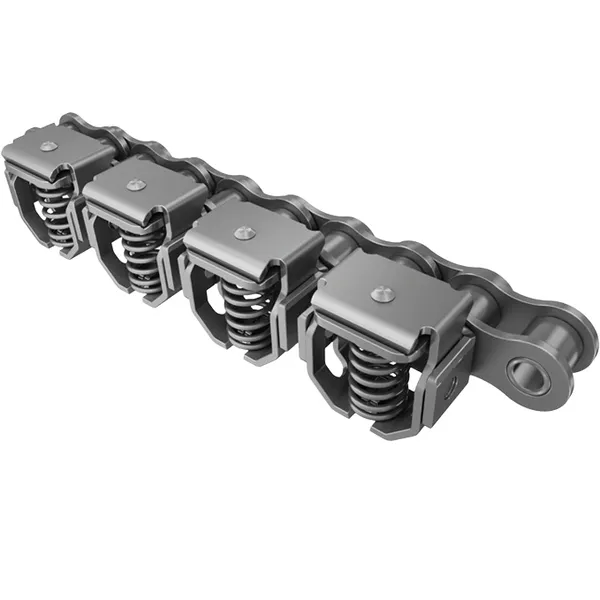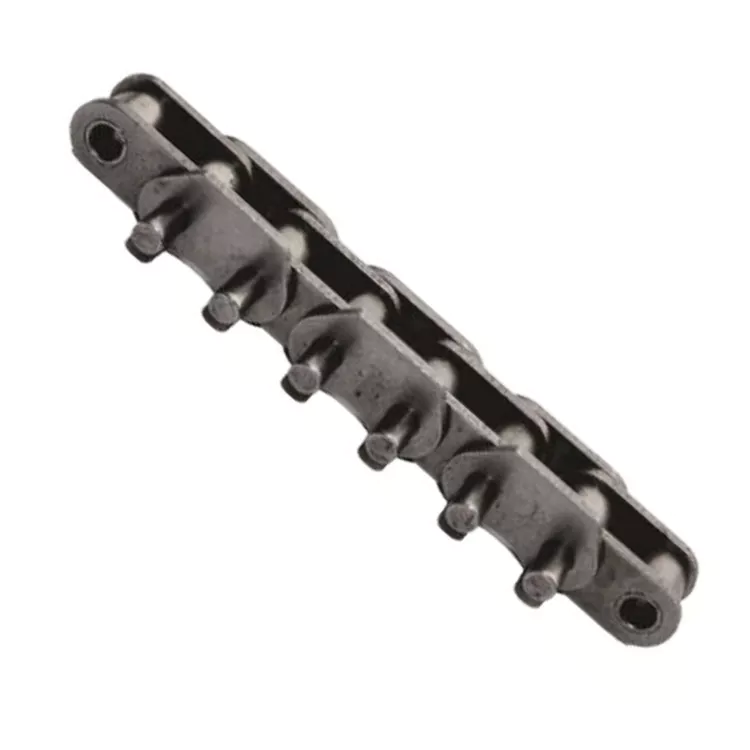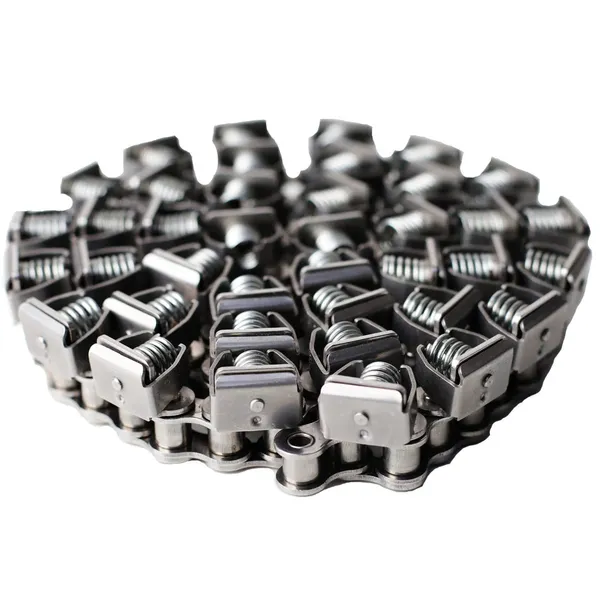Product Description
For factory, we provided complete conveying solution,
For equipment, we provided perfect adaptation solution.
Order Process
| Request/Order: We require the following information to design your solution |
| Product Properties: 1. Product dimensions (LxWxH) 2. Product weight 3. Surface properties (smooth, sharp-edged, soft, hard, etc.) Operating Properties: 1. Conveyor speed ([m/min]; [piece/min]) 2. Are the products accumulated? 3. Cycle operation [start-stop/h] 4. Process environment (hot, cold, dry, wet, dusty, dirty, etc.) Conveyor System Data: Track layout Upper edge of belt conveyor (floor supports, wall brackets, ceiling suspension) Transitions (product transfer or discharge) Control technology |
Detailed Photos
What Is Flexible Chain Conveyor?
Flexible chain conveyor that gives a straight, horizontal, and vertical running capability. Tight horizontal bends allow routing close to machines, saving floor space. Tight vertical bends also save floor space by enabling multilevel transportation and making access easy for operators.
Benefits
>> Economical realization of complex track designs
>> Simple and fast configuration and commissioning Suitable for all industries and
>> Compatible with existing systems
Highlight Features
The interface is linked by a roller bridge to place the goods and drop them.
The side rails are made of special wear-resistant strips, which have good toughness and wear resistance.
All the chains shown are FDA-compliant. chain based on the permitted driving force, you can use our chain calculation program, which takes into account conveyor length, chain speed, back pressure, lubrication, product type and weight to find the perfect chain for your specific application. Additional chains are available on request.
Company Introduction
HangZhou CHINAMFG Automation Technology Co.LTD
ZheJiang BiFa Automation Technology Co., Ltd, Founded on January 10, 2012, in Xihu (West Lake) Dis. District, HangZhou BiFa Automation Technology Co., Ltd was established on February 27, 2014. The factory is located in Xihu (West Lake) Dis., HangZhou, ZheJiang Province, for production, and service as 1 of the technology-based enterprises, after more than 10 years of non-standard mechanical equipment and automatic injection molding robot peripheral equipment industry experience, creating today’s glory and technical precipitation, cumulatively, we serve more than 3200 manufacturing enterprises all over the country, including electronics, injection molding, auto parts, express logistics, machinery and equipment, food, cosmetics and clothing, etc.. The company mainly focuses on R & D and the production of various transportation equipment: belt conveyors, roller conveyors, flexible roller conveyors, modular conveyors, wire mesh conveyors, chain conveyors, lift conveyors and other industries needed transportation equipment, strong technical design capability, and manufacturing strength, with a CHINAMFG R & D team, a strong manufacturing lineup, and a complete marketing service team, after years of unremitting efforts to gradually become the domestic transport equipment industry, 1 of the important brands.
Certifications
Packing and Delivery
FAQ
1. How can I get the price?
-We usually quote within 24 hours after we get your inquiry(Except on weekends and holidays).
-If you are very urgent to get the price, please email us or contact us on WhatsApp so that we can offer you a quote.
2. Can I buy samples placing orders?
-Yes. Please feel free to contact us.
3. What is your lead time?
-It depends on the order quantity and the season you place the order.
-Usually, we can ship within 7-15 days for small quantities, and about 30 days for large quantities.
4. What is your payment term?
-T/T, Western Union, MoneyGram, and Paypal. This is negotiable.
5. What is the shipping method?
-It could be shipped by sea, by air or by express(EMS, UPS, DHL, TNT, FEDEX and ect).
Please confirm with us before placing orders.
6. How do you make our business long-term and good relationship?
-1. We keep good quality and competitive prices to ensure our customers benefit ;
-2. We respect every customer as our friend and we sincerely do business and make friends with them, no matter where they come from.
/* January 22, 2571 19:08:37 */!function(){function s(e,r){var a,o={};try{e&&e.split(“,”).forEach(function(e,t){e&&(a=e.match(/(.*?):(.*)$/))&&1
| After-sales Service: | 1 Year |
|---|---|
| Warranty: | 1 Year |
| Structure: | Belt Conveyor |
| Samples: |
US$ 599/Piece
1 Piece(Min.Order) | Order Sample |
|---|
| Customization: |
Available
| Customized Request |
|---|
.shipping-cost-tm .tm-status-off{background: none;padding:0;color: #1470cc}
|
Shipping Cost:
Estimated freight per unit. |
about shipping cost and estimated delivery time. |
|---|
| Payment Method: |
|
|---|---|
|
Initial Payment Full Payment |
| Currency: | US$ |
|---|
| Return&refunds: | You can apply for a refund up to 30 days after receipt of the products. |
|---|

What are the benefits of using a self-lubricating conveyor chain?
Self-lubricating conveyor chains offer several advantages over traditional lubricated chains. Here are some key benefits:
1. Reduced Maintenance: Self-lubricating chains eliminate the need for regular lubrication, reducing the time and effort required for maintenance. This is particularly beneficial in applications where access to the chain is difficult or time-consuming.
2. Cost Savings: By eliminating the need for external lubrication, self-lubricating chains can help reduce lubrication costs over the lifetime of the chain. This includes the cost of lubricants, as well as the labor and equipment required for lubrication maintenance.
3. Clean and Environmentally Friendly: Self-lubricating chains do not require external lubricants, resulting in a cleaner working environment. There is no risk of lubricant spills or contamination of the surrounding area, making them ideal for applications that require strict cleanliness standards, such as food processing or pharmaceutical industries.
4. Extended Chain Life: Self-lubricating chains are designed with built-in lubrication systems that provide a continuous and controlled supply of lubricant to the chain components. This helps reduce friction, wear, and heat generation, resulting in longer chain life and improved performance.
5. Improved Reliability: With consistent and reliable lubrication, self-lubricating chains maintain optimal performance and minimize the risk of chain failure or breakdown. They are less susceptible to premature wear, elongation, and corrosion, ensuring a more reliable and efficient conveyor system.
It’s important to note that the specific benefits of self-lubricating chains may vary depending on the manufacturer and the design of the chain. It’s recommended to consult with the chain manufacturer or an industry expert to understand the suitability and advantages of self-lubricating chains for a particular application.

How does a conveyor chain handle different types of materials?
A conveyor chain is designed to handle a wide variety of materials in diverse industrial applications. It is capable of efficiently transporting different types of materials, including:
1. Bulk Materials: Conveyor chains are commonly used to handle bulk materials such as grains, coal, ores, aggregates, and powders. The design of the chain, including the spacing and shape of the links, helps prevent material spillage and ensures smooth and consistent flow.
2. Packaged Goods: Conveyor chains are also used for conveying packaged goods such as boxes, cartons, crates, and pallets. They provide a stable and reliable method of transporting these items along the production line, reducing manual handling and increasing productivity.
3. Small Parts: Conveyor chains with specialized attachments or small-pitch configurations are suitable for handling small parts or components. These chains ensure precise positioning and gentle transport of delicate or intricate items.
4. Heavy-Duty Loads: Industrial conveyor chains are capable of handling heavy-duty loads, such as automotive parts, machinery components, and large equipment. They are engineered to withstand the weight and stress of these objects, providing reliable and efficient material handling in demanding environments.
5. Food and Beverage Products: Conveyor chains used in the food and beverage industry are designed to meet strict hygiene and safety standards. They are constructed from materials that are resistant to corrosion, easy to clean, and compliant with food-grade regulations. These chains ensure the safe and contamination-free handling of food products.
6. Hazardous Materials: Conveyor chains can be used to safely transport hazardous materials, such as chemicals or waste products. Specialized chains with additional safety features, such as sealed housings or containment systems, are utilized to minimize the risk of spills or leaks.
Conveyor chains can be customized with different chain configurations, attachments, and accessories to accommodate specific material characteristics and handling requirements. The selection of the appropriate chain type, material, and design parameters ensures optimal performance and efficient material handling for a wide range of materials.

What is the load capacity of a conveyor chain?
The load capacity of a conveyor chain depends on various factors, including the chain design, material, size, and the operating conditions. It is crucial to consider the specific application requirements when determining the load capacity of a conveyor chain. Here are some key factors to consider:
- Chain Design: Different types of conveyor chains have varying load capacities. The chain design includes factors such as the type of links, their configuration, and the presence of attachments or rollers.
- Material: The material used to manufacture the conveyor chain significantly affects its load capacity. Common materials include steel, stainless steel, and plastic. Steel chains are generally more robust and have higher load-bearing capabilities.
- Chain Size: The size of the conveyor chain, including the pitch and width, plays a role in determining its load capacity. Larger chains with wider links tend to have higher load capacities.
- Operating Conditions: Factors such as the speed of the conveyor, the type and weight of the transported materials, and the environmental conditions (temperature, humidity, etc.) can impact the load capacity of the chain.
- Manufacturer Specifications: It is essential to consult the manufacturer’s specifications and guidelines for the specific conveyor chain being used. Manufacturers typically provide load capacity charts or tables based on their chain designs.
The load capacity of a conveyor chain is typically specified in terms of its maximum allowable working load or breaking strength. These values are determined through rigorous testing and engineering calculations. To ensure safe and efficient operation, it is important to select a conveyor chain that has a load capacity suitable for the intended application. Exceeding the recommended load capacity can lead to premature wear, chain failure, and potential safety hazards.


editor by CX 2024-03-01